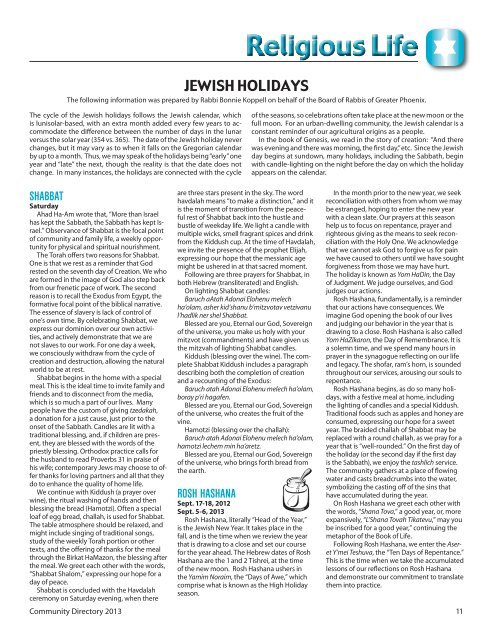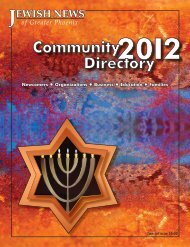downloadable PDF - Jewish News of Greater Phoenix
downloadable PDF - Jewish News of Greater Phoenix
downloadable PDF - Jewish News of Greater Phoenix
You also want an ePaper? Increase the reach of your titles
YUMPU automatically turns print PDFs into web optimized ePapers that Google loves.
The cycle <strong>of</strong> the <strong>Jewish</strong> holidays follows the <strong>Jewish</strong> calendar, which<br />
is lunisolar-based, with an extra month added every few years to accommodate<br />
the difference between the number <strong>of</strong> days in the lunar<br />
versus the solar year (354 vs. 365). The date <strong>of</strong> the <strong>Jewish</strong> holiday never<br />
changes, but it may vary as to when it falls on the Gregorian calendar<br />
by up to a month. Thus, we may speak <strong>of</strong> the holidays being “early” one<br />
year and “late” the next, though the reality is that the date does not<br />
change. In many instances, the holidays are connected with the cycle<br />
SHABBAT<br />
Saturday<br />
Ahad Ha-Am wrote that, “More than Israel<br />
has kept the Sabbath, the Sabbath has kept Israel.”<br />
Observance <strong>of</strong> Shabbat is the focal point<br />
<strong>of</strong> community and family life, a weekly opportunity<br />
for physical and spiritual nourishment.<br />
The Torah <strong>of</strong>fers two reasons for Shabbat.<br />
One is that we rest as a reminder that God<br />
rested on the seventh day <strong>of</strong> Creation. We who<br />
are formed in the image <strong>of</strong> God also step back<br />
from our frenetic pace <strong>of</strong> work. The second<br />
reason is to recall the Exodus from Egypt, the<br />
formative focal point <strong>of</strong> the biblical narrative.<br />
The essence <strong>of</strong> slavery is lack <strong>of</strong> control <strong>of</strong><br />
one’s own time. By celebrating Shabbat, we<br />
express our dominion over our own activities,<br />
and actively demonstrate that we are<br />
not slaves to our work. For one day a week,<br />
we consciously withdraw from the cycle <strong>of</strong><br />
creation and destruction, allowing the natural<br />
world to be at rest.<br />
Shabbat begins in the home with a special<br />
meal. This is the ideal time to invite family and<br />
friends and to disconnect from the media,<br />
which is so much a part <strong>of</strong> our lives. Many<br />
people have the custom <strong>of</strong> giving tzedakah,<br />
a donation for a just cause, just prior to the<br />
onset <strong>of</strong> the Sabbath. Candles are lit with a<br />
traditional blessing, and, if children are present,<br />
they are blessed with the words <strong>of</strong> the<br />
priestly blessing. Orthodox practice calls for<br />
the husband to read Proverbs 31 in praise <strong>of</strong><br />
his wife; contemporary Jews may choose to <strong>of</strong>fer<br />
thanks for loving partners and all that they<br />
do to enhance the quality <strong>of</strong> home life.<br />
We continue with Kiddush (a prayer over<br />
wine), the ritual washing <strong>of</strong> hands and then<br />
blessing the bread (Hamotzi). Often a special<br />
loaf <strong>of</strong> egg bread, challah, is used for Shabbat.<br />
The table atmosphere should be relaxed, and<br />
might include singing <strong>of</strong> traditional songs,<br />
study <strong>of</strong> the weekly Torah portion or other<br />
texts, and the <strong>of</strong>fering <strong>of</strong> thanks for the meal<br />
through the Birkat HaMazon, the blessing after<br />
the meal. We greet each other with the words,<br />
“Shabbat Shalom,” expressing our hope for a<br />
day <strong>of</strong> peace.<br />
Shabbat is concluded with the Havdalah<br />
ceremony on Saturday evening, when there<br />
JEWISH HOLIDAYS<br />
are three stars present in the sky. The word<br />
havdalah means “to make a distinction,” and it<br />
is the moment <strong>of</strong> transition from the peaceful<br />
rest <strong>of</strong> Shabbat back into the hustle and<br />
bustle <strong>of</strong> weekday life. We light a candle with<br />
multiple wicks, smell fragrant spices and drink<br />
from the Kiddush cup. At the time <strong>of</strong> Havdalah,<br />
we invite the presence <strong>of</strong> the prophet Elijah,<br />
expressing our hope that the messianic age<br />
might be ushered in at that sacred moment.<br />
Following are three prayers for Shabbat, in<br />
both Hebrew (transliterated) and English.<br />
On lighting Shabbat candles:<br />
Baruch aAtah Adonai Elohenu melech<br />
ha’olam, asher kid’shanu b’mitzvotav vetzivanu<br />
l’hadlik ner shel Shabbat.<br />
Blessed are you, Eternal our God, Sovereign<br />
<strong>of</strong> the universe, you make us holy with your<br />
mitzvot (commandments) and have given us<br />
the mitzvah <strong>of</strong> lighting Shabbat candles.<br />
Kiddush (blessing over the wine). The complete<br />
Shabbat Kiddush includes a paragraph<br />
describing both the completion <strong>of</strong> creation<br />
and a recounting <strong>of</strong> the Exodus:<br />
Baruch atah Adonai Elohenu melech ha’olam,<br />
boray p’ri hagafen.<br />
Blessed are you, Eternal our God, Sovereign<br />
<strong>of</strong> the universe, who creates the fruit <strong>of</strong> the<br />
vine.<br />
Hamotzi (blessing over the challah):<br />
Baruch atah Adonai Elohenu melech ha’olam,<br />
hamotzi lechem min ha’aretz.<br />
Blessed are you, Eternal our God, Sovereign<br />
<strong>of</strong> the universe, who brings forth bread from<br />
the earth.<br />
ROSH HASHANA<br />
Sept. 17-18, 2012<br />
Sept. 5-6, 2013<br />
Rosh Hashana, literally “Head <strong>of</strong> the Year,”<br />
is the <strong>Jewish</strong> New Year. It takes place in the<br />
fall, and is the time when we review the year<br />
that is drawing to a close and set our course<br />
for the year ahead. The Hebrew dates <strong>of</strong> Rosh<br />
Hashana are the 1 and 2 Tishrei, at the time<br />
<strong>of</strong> the new moon. Rosh Hashana ushers in<br />
the Yamim Noraim, the “Days <strong>of</strong> Awe,” which<br />
comprise what is known as the High Holiday<br />
season.<br />
Religious Life<br />
The following information was prepared by Rabbi Bonnie Koppell on behalf <strong>of</strong> the Board <strong>of</strong> Rabbis <strong>of</strong> <strong>Greater</strong> <strong>Phoenix</strong>.<br />
ì<br />
<strong>of</strong> the seasons, so celebrations <strong>of</strong>ten take place at the new moon or the<br />
full moon. For an urban-dwelling community, the <strong>Jewish</strong> calendar is a<br />
constant reminder <strong>of</strong> our agricultural origins as a people.<br />
In the book <strong>of</strong> Genesis, we read in the story <strong>of</strong> creation: “And there<br />
was evening and there was morning, the first day,” etc. Since the <strong>Jewish</strong><br />
day begins at sundown, many holidays, including the Sabbath, begin<br />
with candle-lighting on the night before the day on which the holiday<br />
appears on the calendar.<br />
In the month prior to the new year, we seek<br />
reconciliation with others from whom we may<br />
be estranged, hoping to enter the new year<br />
with a clean slate. Our prayers at this season<br />
help us to focus on repentance, prayer and<br />
righteous giving as the means to seek reconciliation<br />
with the Holy One. We acknowledge<br />
that we cannot ask God to forgive us for pain<br />
we have caused to others until we have sought<br />
forgiveness from those we may have hurt.<br />
The holiday is known as Yom HaDin, the Day<br />
<strong>of</strong> Judgment. We judge ourselves, and God<br />
judges our actions.<br />
Rosh Hashana, fundamentally, is a reminder<br />
that our actions have consequences. We<br />
imagine God opening the book <strong>of</strong> our lives<br />
and judging our behavior in the year that is<br />
drawing to a close. Rosh Hashana is also called<br />
Yom HaZikaron, the Day <strong>of</strong> Remembrance. It is<br />
a solemn time, and we spend many hours in<br />
prayer in the synagogue reflecting on our life<br />
and legacy. The sh<strong>of</strong>ar, ram’s horn, is sounded<br />
throughout our services, arousing our souls to<br />
repentance.<br />
Rosh Hashana begins, as do so many holidays,<br />
with a festive meal at home, including<br />
the lighting <strong>of</strong> candles and a special Kiddush.<br />
Traditional foods such as apples and honey are<br />
consumed, expressing our hope for a sweet<br />
year. The braided challah <strong>of</strong> Shabbat may be<br />
replaced with a round challah, as we pray for a<br />
year that is “well-rounded.” On the first day <strong>of</strong><br />
the holiday (or the second day if the first day<br />
is the Sabbath), we enjoy the tashlich service.<br />
The community gathers at a place <strong>of</strong> flowing<br />
water and casts breadcrumbs into the water,<br />
symbolizing the casting <strong>of</strong>f <strong>of</strong> the sins that<br />
have accumulated during the year.<br />
On Rosh Hashana we greet each other with<br />
the words, “Shana Tova,” a good year, or, more<br />
expansively, “L’Shana Tovah Tikatevu,” may you<br />
be inscribed for a good year,” continuing the<br />
metaphor <strong>of</strong> the Book <strong>of</strong> Life.<br />
Following Rosh Hashana, we enter the Aseret<br />
Y’mei Teshuva, the “Ten Days <strong>of</strong> Repentance.”<br />
This is the time when we take the accumulated<br />
lessons <strong>of</strong> our reflections on Rosh Hashana<br />
and demonstrate our commitment to translate<br />
them into practice.<br />
Community Directory 2013 11



